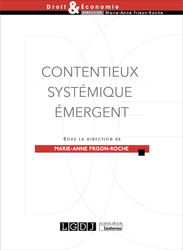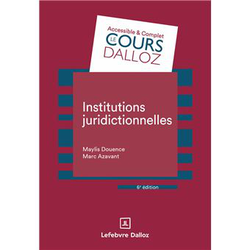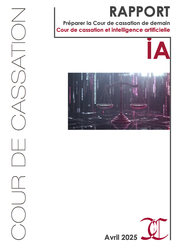Editorial responsibilities : Direction de la collection "Droit et Économie", L.G.D.J. - Lextenso éditions (30)

🌐follow Marie-Anne Frison-Roche on LinkedIn
🌐subscribe to the Newsletter MAFR. Regulation, Compliance, Law
____
► Full Reference: M.-A. Frison-Roche (ed.), Contentieux Systémique Émergent (Emerging Systemic Litigation), Paris, LGDJ, "Droit & Économie" Serie, to be published
____
📚Consult all the other books of the Serie in which this book is published
____
► General Presentation of the Book :
____
TABLE OF CONTENTS
Aug. 20, 2025
Editorial responsibilities : Direction of the collection "Cours-Série Droit privé", Editions Dalloz (33)

► Référence complète : M. Douence et M. Azavant, Institutions juridictionnelles, 1ière éd. 2010, 6ième éd. 2025, Coll. "Cours Dalloz-Série Droit privé", Dalloz, 2025, 425 p.
____
►Présentation de l'ouvrage : La nouvelle édition de cet ouvrage expose les "Institutions juridictionnelles", expression qui a remplacé heureusement celle "d'Institutions judiciaires", c'est-à-dire les principes, les structures et les personnes qui permettent la réalisation de la mission de trancher les litiges et de dire le droit. Sont ainsi analysés la justice administrative et judiciaire, les juridictions et les acteurs que sont les magistrats et les auxiliaires de justice, notamment les avocats.
L'ouvrage est destiné aux étudiants et à ceux qui préparent des concours administratifs ou par exemple l'examen d'entrée aux Écoles de formation des Barreaux.
____
📚 Dans la même collection, il s'articule avec les ouvrages de :
____
📚 Voir l'ensemble des ouvrages de la même collection 📎"Cours Dalloz -Série Droit privé"
________
April 28, 2025
Thesaurus : Doctrine

► Référence complète : Cour de cassation, Préparer la Cour de cassation de demain. Cour de cassation et intelligence artificielle, rapport, avr. 2025, 159 p.
____
________
March 5, 2025
Thesaurus : Doctrine
► Référence générale : C. Chainais, X. Lagarde et A. Martinel (dir.), L'énigme du gracieus. Quel avenir pour la protection juridictionnelle, IRJS Editions, coll. "Bibliothèque de l'IRJS - André Tunc, 2025, 125 p.
____
► présentation de l'ouvrage (par l'éditeur) : "Cet ouvrage rassemble les actes des 12es rencontres de procédure civile qui se sont tenues le 1er décembre 2023 dans la Grand'Chambre de la Cour de cassation. Ces rencontres ont été coordonnées par la deuxième chambre civile de la Cour de cassation, le Centre de recherche sur la justice et le règlement des conflits (CRJ) de l'Université Paris Panthéon-Assas et le Département de recherche « Sorbonne Justice et Procès » (IRJS) de l'École de Droit de la Sorbonne (Université Paris 1 Panthéon-Sorbonne). Après avoir interrogé l'office renouvelé du juge civil en matière de preuve dans le cadre des 11es rencontres de procédure civile, les participants de ces douzièmes rencontres ont concentré leurs réflexions sur l'énigme du gracieux. Ce thème s'est imposé dès lors que, depuis les dernières réformes de la procédure civile, spécialement celles en cours depuis 5 ans, la matière gracieuse a fait l'objet de nombreux aménagements justifiant d'en repenser l'architecture.
____
► les auteurs ayant contribué à l'ouvrage :
🕴️Anne Caron-Déglise,
🕴️Cécile Chainais,
🕴️Vincent Egea,
🕴️Frédérique Ferrand,
🕴️Marielle Jehannin,
🕴️Emmanuel Jeuland,
🕴️Xavier Lagarde,
🕴️Agnès Martinel,
🕴️Julien Théron
🕴️ Nicole Trassoudaine-Verger.
________
Jan. 23, 2025
Interviews

🌐suivre Marie-Anne Frison-Roche sur LinkedIn
🌐s'abonner à la Newsletter MAFR Regulation, Compliance, Law
🌐s'abonner à la Newsletter en vidéo MAFR Surplomb
____
► Full Reference: M.-A. Frison-Roche, « La compliance est avant tout une affaire humaine» (Compliance is first and foremost a human issue), interview conducted by Olivia Dufour for Actu-juridique, Lextenso, 23 January 2025.
___
► read the interview: 💬in French)
____
🏛️🏛️🏛️🏛️this interview was organised following a number of official opening hearings of Parisian courts, in particular that of the Paris Judicial Court on 21 January 2025, at which the presidents of these courts explained the role now played by systemic litigation and compliance and/or vigilance law, in particular in the internal organisation of their courts.
____
► presentation of this interview:
Q. (translated): At the start of the new session of the official opening hearings of Paris Court of First Instance on 21 January, President Stéphane Noël spoke at length about the creation of a 34th chamber dedicated to handling cases relating to companies' obligation of vigilance. What are the advantages of this new specialisation?
MAFR Answer Summary: It corresponds to the jurisdiction given to the Paris Court of First Instance by the French 2020 so-called Confidence Act, which extends the French 2017 so-called Vigilance Act. It reflects the importance of Compliance Law, of which Vigilance is the leading edge.
Q. (translated): The court president points out that this new litigation raises questions about the role of the courts, which is to "concilier le respect des buts fondamentaux pour la protection de l’humanité avec la possibilité pour les entreprises d’apprécier la maitrise des risques et leur éventuelle responsabilité" ("reconcile respect for the monumental goals of protecting humanity with the ability of companies to assess the control of risks and their potential liability"). What do you think?
MAFR Answer Summary: the role of the judge has been renewed, as they take charge of the future of the systems and participates in the achievement of the Monumental Goals of Compliance Law. Companies are subject by law to a new compliance obligation and must demonstrate their diligence. They may be held liable under the general ordinary legal regime, as set out in the French 2017 Act on Vigilance duty, if the claimant demonstrates the existence of fault or negligence, damage and a causal link between the 2.
Q. (translated): All this comes under the heading of compliance, a concept you've been working on for 10 years and which is still not fully understood and is too often confused with conformity....
MAFR Answer Summary: The 2 aforementioned concepts ("conformity" and "compliance") were identified in the article I published in 2016 entitled Le droit de la compliance"Compliance law". This notion has taken a long time to mature because, on the one hand, it is a radically new branch of law that has an impact on the other branches. On the other hand, indeed, there is confusion between 'compliance' and 'conformity'. Conformity is the obedience to applicable regulations; compliance is the active participation in the achievement of monumental goals to preserve or save systems in which humans are involved. Conformity is, and is only, a tool of Compliance Law.
Q. (translated): The Nanterre Court has just created a chamber for Emerging Systemic and Regulatory Litigation. Does this confirm the interest of the courts in this fundamental development?
MAFR Answer Summary: This statement by the President of the Nanterre Court of Appeal at his hearing on 20 January 2025 illustrates the Regulation - Compliance - Vigilance continuum. He involves training for judges and dialogue between judges. Training and dialogue are being put in place.
Q. (translated): Y a-t-il d’autres initiatives en ce sens ?
MAFR Answer Summary:Le président du Tribunal de commerce Paris à son audience du 15 janvier 2025 a annoncé la création d'une chambre des contentieux complexe. Les contentieux systémiques émergents, que le Droit de la Compliance peut engendrer, ont vocation à y être présentés. Là aussi, formation et dialogue se mettent en place.
Q. (translated): Que manque-t-il encore ?
MAFR Answer Summary: puisque le Droit de la compliance se contractualise de plus en plus, notamment dans les chaines de valeur concernées par les techniques de vigilance, l'arbitrage international est concerné. Des arbitres internationaux intégrant le droit de la compliance, et pas seulement attaché à telle et telle réglementation sectorielle, sont un enjeu d'attractivité de la Place de Paris. Cela va émerger, notamment par le dynamisme de la Cour internationale d'arbitrage, dont le siège est à Paris.
_________

Jan. 11, 2025
Publications

🌐suivre Marie-Anne Frison-Roche sur LinkedIn
🌐s'abonner à la Newsletter MAFR Regulation, Compliance, Law
🌐s'abonner à la Newsletter en vidéo MAFR Surplomb
____
 ► Full Reference: M.-A. Frison-Roche, The puzzle of Institutional Compliance Law and Substantive Compliance Law: the example of the European Regulations of 31 May 2024 on AMLA and enterprises compliance obligations, Working Paper, January 2025.
► Full Reference: M.-A. Frison-Roche, The puzzle of Institutional Compliance Law and Substantive Compliance Law: the example of the European Regulations of 31 May 2024 on AMLA and enterprises compliance obligations, Working Paper, January 2025.
____
🎤 This Working Paper was developed as a basis for the Overhang👁 video on 11 January 2024 :
____
🎬🎬🎬In the collection of the Overhangs👁 It falls into the News category.
►Watch the complete collection of the Overhangs👁 : click HERE
____
► Summary of this Working Paper: Compliance Law is built on 2 legs, Institutions on the one hand and substantive rules on the other. For example in the United States, the 1934 Act established at the same time the prohibition and prevention of financial market abuse and the SEC. In Europe, in 2013, the Banking Union established institutions to build this Union and increased the obligations on banks.
This is perfectly illustrated by the 2 European Regulations of 31 May 2024, one creating the AMLA and the other reinforcing the compliance obligations of crucial economic operators, one text referring to the other.
Indeed, Institutional Compliance Law and Substantive Compliance Law are like 2 articulated legs. You have to know both and make them work together.
This is part of the "European puzzle", a positive expression which implies that, when assessing and interpreting a text, we should always bear in mind that it is only one element of a general picture, which is coloured by its Monumental Goal: in this case to obtain a European area where money laundering is efficiently prevented thanks to the action of the companies themselves under the supervision and support of a Supervisory Authority which coordinates the actions of the States.
If we consider only one element, we find everything 'complicated', whereas the overall picture is simple, because the Goal is simple and in Compliance Law, a branch of Teleological Law, everything is in the Monumental Goal.
____
🔓read the developments below ⤵️
Updated: Feb. 2, 2023 (Initial publication: June 23, 2021)
Thesaurus : Doctrine

► Full Reference: L.-M. Augagneur, "La juridictionnalisation de la réputation par les plateformes" ("The jurisdictionalisation of reputation by platforms"), in M.-A. Frison-Roche (ed.), La juridictionnalisation de la Compliance, coll. "Régulations & Compliance", Journal of Regulation & Compliance (JoRC) and Dalloz, 2023, p. 97-113.
____
📕read a general presentation of the book, La juridictionnalisation de la Compliance, in which this article is published.
____
► Summary of the article (done by the author): The large platforms are in the position of arbiter of the reputation economy (referencing, notoriety) in which they themselves act. Although the stakes are usually low on a unit basis, the jurisdiction of reputation represents significant aggregate stakes. Platforms are thus led to detect and assess reputation manipulations (by users: SEO, fake reviews, fake followers; or by the platforms themselves as highlighted by the Google Shopping decision issued by the European Commission in 2017) that are implemented on a large scale with algorithmic tools.
The identification and treatment of manipulations is itself only possible by means of artificial intelligence tools. Google thus proceeds with an automated downgrading mechanism for sites that do not follow its guidelines, with the possibility of requesting a review through a very summary procedure entirely conducted by an algorithm. Tripadvisor, on the other hand, uses an algorithm to detect false reviews based on "fraud modeling to identify electronic patterns that cannot be detected by the human eye". It only conducts a human investigation in limited cases.
This jurisdictionality of reputation has little in common with that defined by the jurisprudence of the Court of Justice (legal origin, contradictory procedure, independence, application of the Rules of Law). It is characterized, on the one hand, by the absence of transparency of the rules and even of the existence of rules stated in predicative form and applied by deductive reasoning. It is replaced by an inductive probabilistic model by the identification of abnormal behaviors in relation to centroids. This approach of course raises the issue of statistical bias. More fundamentally, it reflects a transition from Rule of Law, not so much to "Code is Law" (Laurence Lessig), but to "Data is Law", that is, to a governance of numbers (rather than "by" numbers). It also comes back to a form of collective jurisdictionality, since the sanction comes from a computational apprehension of the phenomena of the multitude and not from an individual appreciation. Finally, it appears particularly consubstantial with compliance, since it is based on a teleological approach (the search for a finality rather than the application of principles).
On the other hand, this jurisdictionality is characterized by man-machine cooperation, whether in the decision-making process (which poses the problem of automaticity bias) or in the contradictory procedure (which poses, in particular, the problems of discussion with the machine and the explicability of the machine response).
Until now, the supervision of these processes has been based essentially on the mechanisms of transparency, a limited adversarial requirement and the accessibility of appeal channels. The French Law Loi pour une République Numérique ("Law for a Digital Republic"), the European Legislation Platform-to-Business Regulation and the Omnibus Directive, have thus set requirements on the ranking criteria on platforms. The Omnibus Directive also requires that professionals guarantee that reviews come from consumers through reasonable and proportionate measures. As for the European Digital Services Act, it provides for transparency on content moderation rules, procedures and algorithms. But this transparency is often a sham. In the same way and for the moment the requirements of sufficient human intervention and adversarial processes appear very limited in the draft text.
The most efficient forms of this jurisdictionality ultimately emerge from the role played by third parties in a form of participatory dispute resolution. Thus, for example, FakeSpot detects false Tripadvisor reviews, Sistrix establishes a ranking index that helped establish the manipulation of Google's algorithm in the Google Shopping case by detecting artifacts based on algorithm changes. Moreover, the draft Digital Services Act envisages recognizing a specific status for trusted flaggers who identify illegal content on platforms.
This singular jurisdictional configuration (judge and party platform, massive situations, algorithmic systems for handling manipulations) thus leads us to reconsider the grammar of the jurisdictional process and its characteristics. If Law is a language (Alain Sériaux), it offers a new grammatical form that would be that of the middle way (mesotès) described by Benevéniste. Between the active and the passive way, there is a way in which the subject carries out an action in which he includes himself. Now, it is the very nature of this jurisdictionality of compliance to make laws by including oneself in them (nomos tithestai). In this respect, the irruption of artificial intelligence in this jurisdictional treatment undoubtedly bears witness to the renewal of the language of Law.
________
March 31, 2021
Conferences

 Full reference: Frison-Roche, M.-A., Compliance et arbitrage. Rapport de synthèse: un adossement (Compliance and Arbitration: a Backing. Conclusion), in Frison-Roche, M.-A. & Racine, J.-B., Compliance et Arbitrage (Compliance and Arbitration), Colloquium co-organised by the Journal of Regulation & Compliance (JoRC) and the Centre de recherches sur la Justice et le Règlement des Conflits (CRJ) of Panthéon-Assas University (Paris II), with the support avec the International Court of Arbitration, Paris, 31st of March 2021
Full reference: Frison-Roche, M.-A., Compliance et arbitrage. Rapport de synthèse: un adossement (Compliance and Arbitration: a Backing. Conclusion), in Frison-Roche, M.-A. & Racine, J.-B., Compliance et Arbitrage (Compliance and Arbitration), Colloquium co-organised by the Journal of Regulation & Compliance (JoRC) and the Centre de recherches sur la Justice et le Règlement des Conflits (CRJ) of Panthéon-Assas University (Paris II), with the support avec the International Court of Arbitration, Paris, 31st of March 2021
_____
Read the program of this colloquium
See Marie-Anne Frison-Roche's conclusion in video (in French, with English subtitles)
These notes of the conclusion have been written as the colloquium took place.
See the video of the entire colloquium (in French, with English subtitles)
___
This colloquium is part of the Cycle of colloquium 2021 organized by the Journal of Regulation & Compliance (JoRC) and its partners around the topic Compliance Juridictionnalization.
This manifestation is in French but the interventions will be the basis for a specific chapter of the English collective book directed by Marie-Anne Frison-Roche, Compliance Juridictionnalization, co-published by the JoRC and Bruylant.
An equivalent book in French, La Juridictionnalisation de la Compliance, directed by Marie-Anne Frison-Roche, will be co-published by the JoRC and Dalloz.
Read the notes established for the conclusion below ⤵️
May 16, 2019
Thesaurus : Doctrine

Référence complète : Le Pluard, Q., et Plouhinec P., (dir.), Du droit dans GAMES OF THRONES, ed. Mare & Martin, coll. "Libre Droit", 2019, 276 p. (à paraitre)
Lire la quatrième de couverture.
Pour lire l'article de Marie-Anne Frison-Roche, Games of Thrones : un droit si classique. Pour l'instant.
July 3, 2018
Thesaurus : Doctrine

Référence complète : Caprioli, É.A., La blockchain dans la banque et la finance (éléments de réflexion juridique), in Études en l'honneur de Philippe Neau-Leduc, Le juriste dans la cité, coll. « Les mélanges », LGDJ- Lextenso, 2018, pp.189-206.
Lire une présentation générale dans lequel l'article est publié.
June 27, 2018
Thesaurus : Doctrine

Référence complète : L'ENA hors les murs, Le droit et la justice aujourd'hui. Et demain ?, n°481, juin 2018, 111 p.
Consulter la présentation de l'article de Marie-Anne Frison-Roche, Le Juge, le Régulateur et le Droit.
May 30, 2018
Thesaurus : 02. Cour de cassation
Nov. 21, 2014
Thesaurus : Doctrine
Dec. 11, 2013
Thesaurus : Doctrine
Référence complète : Collard, Christophe, et Christophe Roquilly. « Les risques juridiques et leur cartographie :proposition de méthodologie », La Revue des Sciences de Gestion, vol. 263-264, no. 5, 2013, pp. 45-55.
Les étudiants de Sciences po peuvent lire l'article via le Drive dans le dossier "MAFR - Régulation & Compliance"
Feb. 16, 1993
Thesaurus : Doctrine

Référence complète : Oppetit, B., Éthique et vie des affaires, in Mélanges offerts à André Colomer, Litec, 1993, pp. 319-333.
Les étudiants de Sciences-Po peuvent lire l'article via le Drive, dossier "MAFR - Regulation & Compliance"
